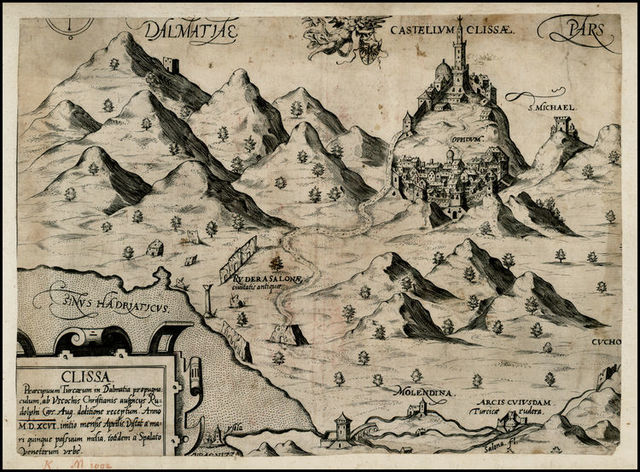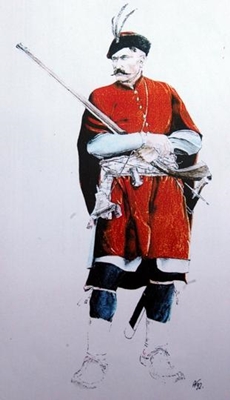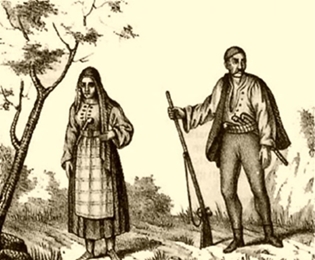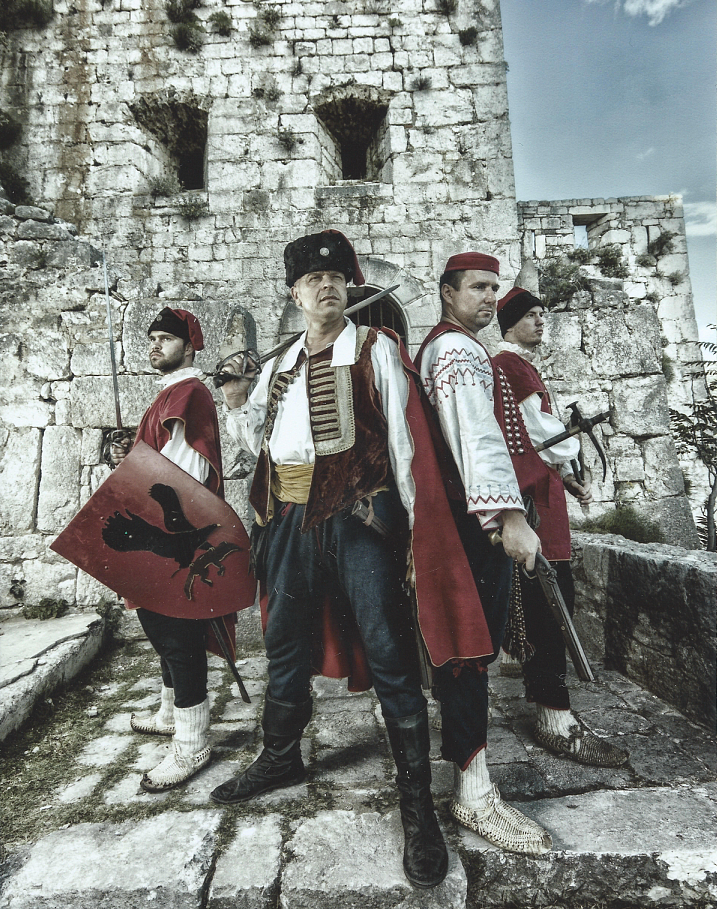History
 At the end of the 15th and in early 16th century, Ottomans have looted and burned land in their first attacks to the west. Men were killed, women raped, and children taken to slavery. From such population, Uskoks are recruited. They vow to came back to their birthplaces and to take revenge on Ottomans everywhere and at every opportunity. They have spread that oath among their generation and passed it on to their offspring. Croatians from coast, who were running away from cruelty and chains of Venetian galleys, have also joined them. Klis, as a town and a fortress, became a place of living and struggle of these people. It literally became an uskok nest!
At the end of the 15th and in early 16th century, Ottomans have looted and burned land in their first attacks to the west. Men were killed, women raped, and children taken to slavery. From such population, Uskoks are recruited. They vow to came back to their birthplaces and to take revenge on Ottomans everywhere and at every opportunity. They have spread that oath among their generation and passed it on to their offspring. Croatians from coast, who were running away from cruelty and chains of Venetian galleys, have also joined them. Klis, as a town and a fortress, became a place of living and struggle of these people. It literally became an uskok nest!
At that time, Klis was commanded by Petar Kružić. Kružić was captain and knez (medieval title used in Croatia, equivalent of duke, count or prince) of Klis and Senj, the second uskok fortress on the Adriatic. Though he was not a member of high nobility, he gained the title of knez because of extraordinary merit in war against Ottomans.
After the fall of Bosnia, Ottomans advanced towards the Adriatic coast. They came to Klis, where their further progress to the west was stopped. Kružić and Uskoks have resisted Ottoman power over more than two decades of continuous sieges and bloody battles. Ultimately, on March 12, 1537, after Petar Kružić's death, Ottomans occupied Klis (learn more - Petar Kružić).
Those Uskoks who survived retreated to Senj where they were hired to the empire's (Habsburg) service. Uskoks were primarily fighting on the land, but soon they recognized benefits of naval actions against Ottomans, so they procured boats and started fighting on the sea. During their expeditions, they were often crossing to the Venetian territory, but Venice did not complain as long as uskok activities suited them.
This changed after the Venetian-Ottoman peace treaty in 1540. Uskok anti-Ottoman activity was no longer adequate to Venice, because then they were obliged to protect Ottoman and other ships carrying Ottoman goods in the Adriatic from uskok attacks. Regardless of this protection, the attacks continued. Sultan Suleiman the Magnificent has threatened to send his fleet to the Adriatic to bring order. To prevent this, Venice began to persecute Uskoks. In 1557, they blocked the most important uskok harbor and fortress - Senj. However, Uskoks have always found ways to defend themselves and cause problems and damages to Ottomans, and also to new/old enemy - Venice.
During the Cyprus War (1570-1573), Venice was again supporting Uskoks, and after signing the peace treaty with Ottomans, they again opposed and prohibited uskok expeditions of the Adriatic. Uskoks have nevertheless continued their activities against Ottomans. Venetian ships began to transport Ottoman goods, so they have become a legitimate target to Uskoks as well. Small uskok boats were successfully attacking and plundering large Venetian galleys between the canals and islands of the eastern Adriatic coast. Venetian galleys received orders to hang captured Uskoks or to use them as galley slaves.
All of this led to the Uskok War between the Habsburg Monarchy (in whose service Uskoks were and under whose authority Senj was) and Venice (1615-1617). The war ended with peace treaty in Madrid. Under conditions of the peace treaty, the Habsburg Monarchy committed to evict Uskoks from Senj and they did. Uskoks moved to the area around Karlovac and the Kupa river, where some of Uskoks have already lived from 1524 in town Žumberak. This way, uskok organized activities were finally over for Venice.
Life and people
 In a community whose existence depended on implacability of its fighting spirit and whose life struggle and grit ware crystallized into lifestyle, everything was subjected to that goal. Children were raised, taught and prepared to inherit their fathers since their early age. Their father's weapons were their toys and they played hunting games, rifle shooting, running and other activities that spur on warrior spirit. They wrestle, fight and strike each other with wood and stone until bleeding.
In a community whose existence depended on implacability of its fighting spirit and whose life struggle and grit ware crystallized into lifestyle, everything was subjected to that goal. Children were raised, taught and prepared to inherit their fathers since their early age. Their father's weapons were their toys and they played hunting games, rifle shooting, running and other activities that spur on warrior spirit. They wrestle, fight and strike each other with wood and stone until bleeding.
In addition to preparing for war battles, Uskoks had not forgotten their childrens' education. Uskoks have sent their children to school to learn to read and write. Children have also practiced with weapons every morning.
If Uskoks were born warriors and to some degree military-trained, they had to thank their life circumstances for this upbringing because they went through a private family military school. Childhood was interrupted early and with twelve-thirteen years, children went to the first adventures full of danger and peril with their fathers and brothers. This first baptism of fire has meant their admittance into the warrior ranks.
 By contemporary descriptions, Uskoks were people of special strain. Tall, strong and slim, with thick beard or a moustache and with a feather on top of their cap, lightly dressed and lightly armed. They were drawing attention and were awe-inspiring with their appearance. They were a patriarchal and pious people who respected elders and worshiped God. All Uskoks were Catholics. Newcomers, Orthodox or Muslims immediately turned to Catholicism. To Uskoks, supreme authority was neither the empire's (Habsburg) court nor Venice, but Pope in Vatican. Only Pope have been sending so much needed help to Uskoks during their battles with Ottomans.
By contemporary descriptions, Uskoks were people of special strain. Tall, strong and slim, with thick beard or a moustache and with a feather on top of their cap, lightly dressed and lightly armed. They were drawing attention and were awe-inspiring with their appearance. They were a patriarchal and pious people who respected elders and worshiped God. All Uskoks were Catholics. Newcomers, Orthodox or Muslims immediately turned to Catholicism. To Uskoks, supreme authority was neither the empire's (Habsburg) court nor Venice, but Pope in Vatican. Only Pope have been sending so much needed help to Uskoks during their battles with Ottomans.
 Uskok women shared all the struggles of their spouses. When their husbands went to war, they guarded home and prisoners, who were always kept due to exchange and redemption. Uskoks have preferably married a woman from their community. If an uskok died, the widow would, either by law or by custom, marry another uskok of the same rank. All property from previous marriage belonged to the widow. It was easier for a mother or wife to bear the death of a son or husband on battlefield than his cowardice.
Uskok women shared all the struggles of their spouses. When their husbands went to war, they guarded home and prisoners, who were always kept due to exchange and redemption. Uskoks have preferably married a woman from their community. If an uskok died, the widow would, either by law or by custom, marry another uskok of the same rank. All property from previous marriage belonged to the widow. It was easier for a mother or wife to bear the death of a son or husband on battlefield than his cowardice.
Uskoks were applying the sudden attack tactics. They would appear out of nowhere and attack when nobody was expecting. They fought when and where they wanted. They went to war expeditions in every season and in all weather conditions, sometimes in smaller, sometimes larger numbers. They liked the cover of shadow, dusk, long winter nights and storms. When Uskoks went to venture, they never knew when and how they would come back. Sometimes they were gone for days, and sometimes for months. In their small and fast boats painted black or red, symbol of death and blood, they did not promise anything good to whom they were coming.
 Throughout a whole century, Uskoks were the only guard of Christianity and Western Europe against the Ottomans. In the times when the Habsburg court paid money tribute to the sultan, Uskoks showed to the whole Europe that they could successfully deal with Ottoman force. Uskoks have disappeared from historical stage when the Habsburg Monarchy became powerful enough to resist the Ottoman Empire. The Ottoman–Habsburg War (1593-1606) established a balance of power. Uskoks, the guardians of Europe, have then become a source of instability between Christian states. Uskoks descended undefeated from historical stage. The uskok epopee represents the ultimate resistance of Croatian people against foreign dominance of the Adriatic. It testifies to what group of our (Croatian) people was capable of for long eighty years at the sea and a whole century on the land against powerful enemies. Their war history is a message that man, and his motivation are decisive factor in war regardless of superiority of enemies. No one defeated Uskoks, they were simply abandoned.
Throughout a whole century, Uskoks were the only guard of Christianity and Western Europe against the Ottomans. In the times when the Habsburg court paid money tribute to the sultan, Uskoks showed to the whole Europe that they could successfully deal with Ottoman force. Uskoks have disappeared from historical stage when the Habsburg Monarchy became powerful enough to resist the Ottoman Empire. The Ottoman–Habsburg War (1593-1606) established a balance of power. Uskoks, the guardians of Europe, have then become a source of instability between Christian states. Uskoks descended undefeated from historical stage. The uskok epopee represents the ultimate resistance of Croatian people against foreign dominance of the Adriatic. It testifies to what group of our (Croatian) people was capable of for long eighty years at the sea and a whole century on the land against powerful enemies. Their war history is a message that man, and his motivation are decisive factor in war regardless of superiority of enemies. No one defeated Uskoks, they were simply abandoned.
About Uskoks
- "The bulwark of Dalmatia" King Matthias
- "The only fortress in the country" Rudolf II
- "Uskoks are the best people in the world for wartime" Emperor Charles V
- "Looked like they had the winds, the sea, and the devils on their side" Minucio Minuci
- "Uskoks can make bora blow whenever it pleases them. They simply set fire on the side and bora starts" Josip Rabatta
- May God keep you safe from Senj (uskoks) hand folk proverb
- "Risen Maccabees" Pope Gregory XII

